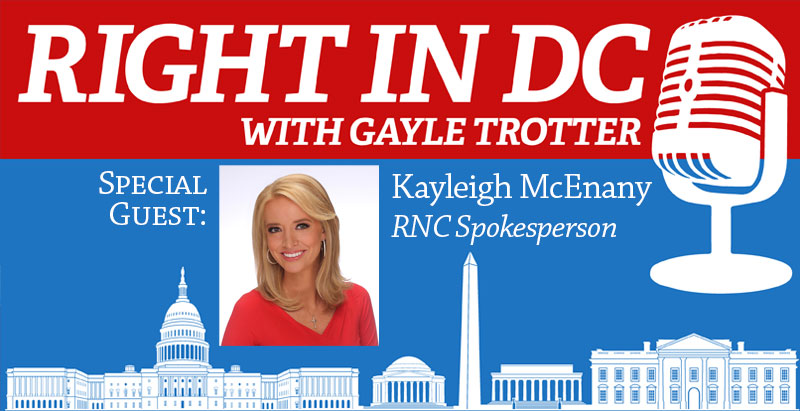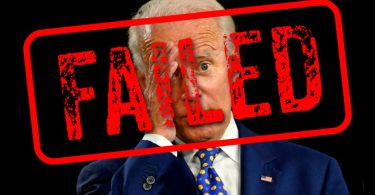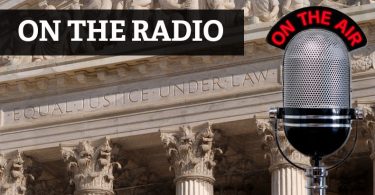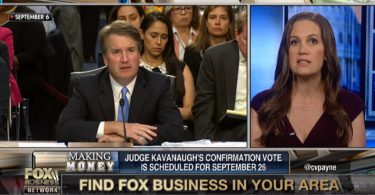 My guest on RIGHT IN DC is Kayleigh McEnany, the Republican National Committee’s national spokesperson. She holds a law degree from Harvard Law School and is the author of the book, “New American Revolution: The Making of a Populist Movement.” Kayleigh is married to a professional baseball pitcher, Sean Gilmartin. I have really enjoyed getting to know her over the last year, meeting in the Green Room at Fox and various other places that we have both been.
My guest on RIGHT IN DC is Kayleigh McEnany, the Republican National Committee’s national spokesperson. She holds a law degree from Harvard Law School and is the author of the book, “New American Revolution: The Making of a Populist Movement.” Kayleigh is married to a professional baseball pitcher, Sean Gilmartin. I have really enjoyed getting to know her over the last year, meeting in the Green Room at Fox and various other places that we have both been.
In our interview, we discuss:
- Why women are criticized for being conservative
- Why the media is not reporting the Trump Administration’s strong support for women
- The importance of taking the offense by talking about the issues, but the media’s aversion to reporting them
- Inside the Republican National Committee and their support for the President
- The need to anticipate counter-arguments and be prepared to respond to them
- Importance of having deep knowledge and experience in order to deal with an unpredictable media
- Memorable media appearances
- The effect of social media on the news cycle
- Why politics has changed forever because of social media
- No more “mannequin politicians”: How authenticity and relatability are the name of the game
- How George H.W. Bush’s final act was to unify the country with his funeral
- How President Trump has expanded the Republican base by bringing in blue collar workers
- Why the gains that have been made can’t be taken for granted if Trump doesn’t win again
- What gives her courage to speak on issues
- Advice given to by a surprising mentor, Alan Colmes
MORE
Kayleigh McEnany is the acting national spokesperson for the Republican National Committee and author of The New American Revolution: The Making of a Populist Movement. Before being announced as RNC national spokesperson, Kayleigh worked as a CNN political commentator. She graduated from Harvard Law School with a Juris Doctor and Georgetown University School of Foreign Service with a BSFS in International Politics. She also studied politics and international relations at Oxford University, St. Edmund Hall.
During the 2016 presidential election, Kayleigh appeared nightly on CNN’s primetime shows and throughout its daytime programming. She was featured on election night, convention, and presidential debate panels. Before joining CNN, Kayleigh appeared on ABC’s “The View” and was regularly featured on various Fox News and Fox Business programs.
In addition to her television work, Kayleigh was a contributor for The Hill and columnist for Above The Law, providing textualist analysis of legal issues. She has also written for various publications like The Daily Caller, The Blaze, Newsmax, PJ Media, The International Business Times, and CNN.com among others.
Prior to Kayleigh’s career in media, she worked as an intern in the Bush White House, Office of Media Affairs. In addition to the White House, she served as an intern for Congressman Adam Putnam, Tom Gallagher for Governor, and Bush-Cheney 2004.
FOLLOW:
Website: http://kayleighmcenany.com/
Twitter: https://twitter.com/kayleighmcenany
Facebook: https://www.facebook.com/Kayleigh-McEnany-182163255176533/
Book: The New American Revolution: The Making of a Populist Movement
–
Help support Gayle’s RIGHT IN DC Podcasts: www.patreon.com/gayletrotter
Access, subscribe and listen to her podcasts on SoundCloud, iTunes, Google Play Music, YouTube, Stitcher and TuneIn
TRANSCRIPT
GT
This is Gayle Trotter, host of Right in DC. Today, my guest is Kayleigh McEnany. She is the Republican National Committee’s national spokesperson. She holds a law degree from Harvard Law School. She’s also an author of a book called New American Revolution: The Making of a Populist Movement. She’s also married to a professional baseball pitcher, Sean Gilmartin.
Kayleigh, thank you so much for joining us today.
KM
Hey, Gayle, thanks for having me.
GT
I really enjoyed getting to know you over the last year, meeting in the Green Room at Fox and various other places that we have both been. I wanted to have you on this show today for several reasons. A lot of women are criticized for being conservatives. Women who are supportive of President Trump and this administration and the strong women that he has surrounding him in trying to continue to have America first and put in good, conservative job-creating policies, like Kellyanne Conway, Mercy Schlapp, Ivanka Trump (who’s an excellent ambassador of women’s entrepreneurship). They take a lot of flak for their support of this administration.
I wanted to have you on to talk about you and talk with you and really hone down into why you took this job and why you’re supportive of this administration and the Republican Party.
KM
Right. This president has been a strong supporter of women. You just look at the results that have come about because of his administration, female unemployment, hitting record lows. You look at the fact that he’s carved out places in two of his budgets for paid family leave. This is something that Democrats have spoken about, but it’s an issue upon which President Trump has acted. It would make a big difference for working mothers all across the country, and, of course, addressing human trafficking. That’s something Ivanka Trump has done.
Women entrepreneurship is another place that this administration has really invested its time and its efforts. Women in STEM: science, technology, engineering, and math. These are all key places where they’ve delivered for women. You wouldn’t know half of that, if not any of it, if you were watching the mainstream media, who have an obsession with Russia collusion and all of the nonsense we see. They have an aversion to talking about the issues, because when you’re talking about the issues, President Trump is winning because he’s delivered.
You’re right to say all of those great women you mentioned are demonized because of their support for the president. It’s a real shame, because they’ve delivered for women across this country.
GT
You’ve been in your current role as spokesperson for the RNC for a little over a year now. What has surprised you most about this job?
KM
I think what’s surprised me most is just the way that the RNC is an extension of the president, which that’s how it should be. That is the theory, that we’re the political arm of the president. But going in, I wasn’t entirely sure what the RNC would be like. It’s the Republican National Committee. Some have said, “Oh, that’s the establishment.” That’s not the case. Coming in here under the leadership of Ronna McDaniel, it’s very far from that. In fact, this committee under her leadership is fully behind the president. Every single morning, the marching orders are how can we support the president and his agenda?
I guess I was surprised by the RNC working as it always was intended to do, being a seamless arm of the president. I think we can credit Ronna McDaniel for that, for making the RNC the strongest possible voice for the President of the United States as we go into 2020.
GT
What lessons have you learned in your work as spokesperson that others could use?
KM
I think one of the most important lessons you learn in this role is that the media will do its best to distract from the issues. The goal of much of the media, not all, but a large portion, is to put the president in a negative light, to place him in a defensive posture. It’s very easy to get caught up in the day-to-day Washington power game of who’s in, who’s out, palace intrigue, all of the collusion nonsense. It’s really important to take the offense and always bring the conversation back to the issue. Because this president, each and every day, it seems like he’s signing a different bill or executive order or doing something great. Those really substantive achievements get lost if they’re not pushed proactively out onto the airways. I think that’s one of the most important pieces of advice I could give to surrogates out there, is to constantly talk about the issues, because this is what this is about at the end of the day, delivering for the American people.
GT
You have a legal academic background. You have communications expertise. Your undergrad degree was at the School of Foreign Service at Georgetown, if I’m correct.
KM
Yes.
GT
I’m curious, what skills or insights you have from your working on many campaigns and all these different areas that you have devoted a lot of time and attention to? What skills or insights do you have that are valuable for our audience?
KM
One of the things I think my background has allowed me to do, and it’s really important when you go into a television or radio segment or any conversation, really, where you’re going to be discussing politics, is to anticipate counterarguments. You know this as being an attorney yourself, how crucial it is to not just think first and foremost the message you want to get out there. Number two, to anticipate the counterarguments that will inevitably come your way and be prepared to give a response to any of those given questions.
I think one of the things that I’ve learned is the media is unpredictable, as you know as well, being in television. You go in thinking you’re going to be discussing one topic and it changes. Oftentimes, live while on air. So being able to respond, having a deep knowledge of the issues, and anticipating those counterarguments I think is absolutely crucial to having a successful career in communications and in politics.
GT
I had an experience like that. We were live on air and the news broke that Nancy Reagan had passed away. That was not something we could’ve prepped for before the show, obviously. But because I have been following politics as long as I can remember, I’ve read many, many books about Nancy Reagan and her relationship with Ronald Reagan, it was very easy to pull out interesting anecdotes from their lives together that was engaging for the audience. I’m curious if you’ve ever had a situation like that. What is the most memorable one where you came on to talk about, I don’t know, the unemployment rate, and then something happened and it really changed your segment? You had to draw on prior knowledge that you had?
KM
Yeah, a similar situation in one case where I was supposed to go on America’s Newsroom. Just before going on the airwaves, news broke that Billy Graham had passed away. They said, “Can you still stick around and do the segment?” I said, “Of course.” I was able to draw on my life and what he meant to me personally. I was fortunate enough to have gone to one of his Crusades. I was a young girl and was able to share my personal experience and what Billy Graham meant to me. Likewise, more recently, with Barbara Bush passing, the same scenario where I was going on to talk about whatever the political issue was, but the news rapidly changed as we commemorated another great life.
Those are the kind of breaking-news scenarios that you oftentimes see in media. It changes by the minute, by the seconds. Having a lifetime of experience, like you noted, I think is very key to succeeding and to being able to swiftly change direction and talk about a subject you weren’t prepared for.
GT
How does social media affect what you do?
KM
Social media makes everything extremely rapid, especially because now the president is someone who’s out on social media in a very authentic way. We’re constantly responding to what has become a faster news cycle. I think this president being on social media in addition to news moving to Twitter and Facebook and other forums mean that the news cycle is very quick. It’s hard to keep pace with. I joke that I’ll take an hour, two hours, to get my hair done and if you’re not looking at your iPhone, you miss about four different news stories. That wasn’t always the case.
Back when I was in college, one news story, maybe two, carried the day, oftentimes more than one day. But now, if you’re not engaged, if you’re not tuned in, if you’re not locked in because of social media, the news is just swiftly changing. A reporter who gets a nugget no longer has to write an entire story. They’re incentivized to get that information out on Twitter and then go and write the full story. The incentive is get it out, get it out quickly, which makes our job very much a rapid-response job.
GT
How do you think it will shape the future of politics and news? This social media environment that we’re in?
KM
I think future politicians, and this is, I think, in part because of social media, but another part because of President Trump, I think politics has changed forever. I think there is now a call for authenticity. Social media allows commentators or TV hosts or sports figures who might previously have seemed untouchable to be really relatable. Especially those who take the time to share their health struggles or their personal lives, their family lives, their hobbies, their interests. It makes the world smaller in a sense and it makes authenticity really the name of the game to either succeeding in media and to succeeding on the political front, to be as authentic as possible. I think that’s what voters expect. It’s what they demand. There’s a clear contrast between the mannequin Hillary Clinton, the politician kind of person who had poll tested her words and practiced them in the mirror, the mannequin politician versus the very authentic president out there who’s not ashamed if he misspells a word on Twitter.
GT
Right. That’s a very big difference. I’m so glad you said that, because it reminds me of Dan Quayle, who got into so much trouble for spelling I think it was “potato” wrong.
KM
Right, “potato.”
GT
I’m curious if you watched any of the state funeral last week of George H.W. Bush and any of the commentary on it. There was a lot of pro, a lot of con. Seemed like the number one type of message that commentators were pushing was that George H.W. Bush was kind and gentle. I wonder if you had any reaction to all of that?
KM
That was certainly the case; what a beautiful funeral. I think that said so much about George H.W. Bush that in his last act of life he chose to unify the country. He welcomed President Trump to his funeral, President Obama, obviously his son, George W. Bush. He brought everyone together. There was no one who was isolated. There were no political shots. I think one of the overwhelming takeaways I took away from that was just what animated his life was a deep faith. I heard one commentator note that he always wished that he had been more vocal about his faith, but he was from the northeast and it was less discussed than maybe some of the Evangelical cultures, where it’s very outward focused.
I thought when I heard one of the eulogists say, his reverend, that Jesus Christ was at the heart of his faith, I thought that, wow, that makes sense that all of these great fruits I’m hearing about from George H.W. Bush, like flying down to an elevator operator’s funeral, White House elevator operator, and giving the eulogy, to being late to his re-election speech, or potentially late, to comfort a staffer whose wife was diagnosed with cancer. I just think those fruits came from a deeper inward faith. I think that to hear that professed was a really beautiful thing to see in addition to the unity message that he delivered in his last act of life, which was planning his funeral.
GT
Speaking of that sermon at his funeral, you might remember the moment where the pastor was talking about on Bush’s last day that Secretary Baker was rubbing President Bush’s feet. The sermonist called to mind Jesus washing his disciple’s feet before Good Friday. I don’t know if you saw the camera coverage of that, but they panned the camera over to Secretary Baker and he bowed his head and gently wept. I thought what a life, what a friendship, what a life of service.
KM
Absolutely. That was a beautiful anecdote about massaging his feet and absolutely recalling the last act of Jesus with his disciplines and that it was an act of service. That was a beautiful moment to watch. It was a beautiful reminder of how we should live our lives by serving others and not losing sight of that being our central purpose here on earth. George H.W. Bush, despite being president, ambassador to the UN, CIA director, vice president, congressman, head of the RNC, and so many other accolades. He never lost sight of the fact that he was a child of God, and that it was his goal in life to serve others. I think that that was a really positive, important message to hear, not just going into the Christmas season, but just overall for life as we approach our own lives and our own tasks on this earth.
GT
You make a very important and great point that the funeral was an opportunity to not only unify the Republican Party, but also just all of us as Americans to have Democratic presidents and Republican presidents.
I’m curious what you think about the Republican party being a big tent. Obviously, politics is a game of addition and not subtraction. What is your sense as we are moving into the new election season and people are starting to think about what’s coming next, what the RNC is going to be doing? What do you see? What is your sense of the finger on the pulse of what the plan is going to be?
KM
This president has forever changed our party in a positive way. The Republican Party was not historically considered the party of blue-collar workers, but I think we officially have become just that. It’s because President Trump came in. He spoke directly to factory workers, to members of unions. He said, “I’m here. I’ll fight for you. I will rectify our trade imbalances. I’ll bring manufacturing jobs back.” In doing so and in providing that message, there was, as two union members described to me, a real mutiny of the rank and file against the union bosses who said, “Go vote Hillary.” But a lot of the rank and file didn’t do that. It’s why President Trump won Michigan, Pennsylvania, Wisconsin, key states.
He expanded our party, I think, for quite some time, broadening our base and reaching those manufacturers and manufacturing workers because under Obama, his final year, we had lost 16,000 manufacturing jobs. Under President Trump, in two years, we’ve built more than 400,000 manufacturing jobs. So a reversal in the trend, and a pretty dramatic one. He’s expanded our party. It’s really important that we take our message to suburban women going forward and bring our healthcare message to this group of individuals who’s also very important to keep in our party going into 2020. I think President Trump’s done a pretty good job expanding our base and we’re stronger than ever going into the next two years.
GT
Speaking of that, thinking of Michigan and Wisconsin, these other states that the Hillary Clinton campaign did not even visit, I think the Democratic Party knows now, that they cannot take these voters for granted or their support for granted. I would assume they’re going to aggressively go after them in the next presidential campaign cycle. It seems like the Democrats in part were asleep at the switch and it’s just that taking people for granted.
What do you think that the Republicans and the independents who support President Trump can do to make sure that that area of support is shored up for the next presidential run?
KM
I think we have to emphasize that the gains we’ve made should not be taken for granted. They can easily be reversed. The quickest way to reverse them is if President Trump does not win re-election, putting someone who will be a far as leftist in the White House, who will roll back our middle-class, blue-collar tax cuts. They’re not permanent at the moment. Quickest way to make sure that they are temporary is to put a Democrat in the White House and likewise to allow the Senate to be overtaken by Democrats, like the House was in 2018.
We have to emphasize that it can’t be taken for granted. Manufacturing was heading in a perilous direction. President Trump has been a fighter for blue-collar workers, a fighter for the middle class. We can’t take that for granted, because the next president, should it not be Donald Trump, will not be someone fighting for the middle class.
The policies we’re hearing from the left are Socialist policies. They’re failed policies. They failed all across the world. I don’t want to see that kind of radical ideology brought to our shores. Should President Trump lose, you can rest assured that’s the direction we’re heading in. It’s the same dangerous direction over the eight years of Obama, where we saw the worst economic recovery post-World War II. Let’s not allow that to retake the White House.
GT
You are a brave person. You go on TV all the time and radio shows advancing positions. You face a lot of criticism online, maybe in your personal life, too, as most people who are willing to stake out a position on a controversial issue. They feel like certainly people feel free to tell them what they think about their opinions.
Do you have a motto or a verse or any other thing that you used to undergird your courage in being out there and speaking on these issues that are so important to your fellow Americans?
KM
Well, certainly prayer. I’m a Christian, and that is very key to me. The Serenity Prayer, I think is a beautiful way to be calm in the face of adversity. Also I would note in addition to my faith, Alan Colmes, who was at Fox News. He passed away, unfortunately. Alan was on the great show Hannity & Colmes. He was a Democrat there. He became an unlikely mentor for me. I say unlikely, because it’s not often a Democrat mentors a young Republican. All the way back from when I was an intern, and when I was on the set of CNN, he used to text me or Facebook message me, rather, and I’d be on those eight-person panels and he would say, “Kayleigh, remember, don’t fight fire with fire. Fight fire with water.”
I’ve always remembered that phrase. I think it’s served me well going through CNN and through my career now. That reminder from the great Alan Colmes, that the best way to fight fire is with water, and to be gentle and the viewer recognizes that. For sure, the main comment that I used to get going through airports in the 2016 election was from people saying, “I don’t support what you say, but I like the way you say it.” I can credit that to Alan Colmes.
GT
That is a beautiful memory. Thank you so much, Kayleigh, for joining us today.
KM
Thanks so much, Gayle.
KM
This is Gayle Trotter. Like me on Facebook, follow me on Twitter, follow me on Instagram, and subscribe to my YouTube channel, and support this show on Patreon. This is Right in DC.








